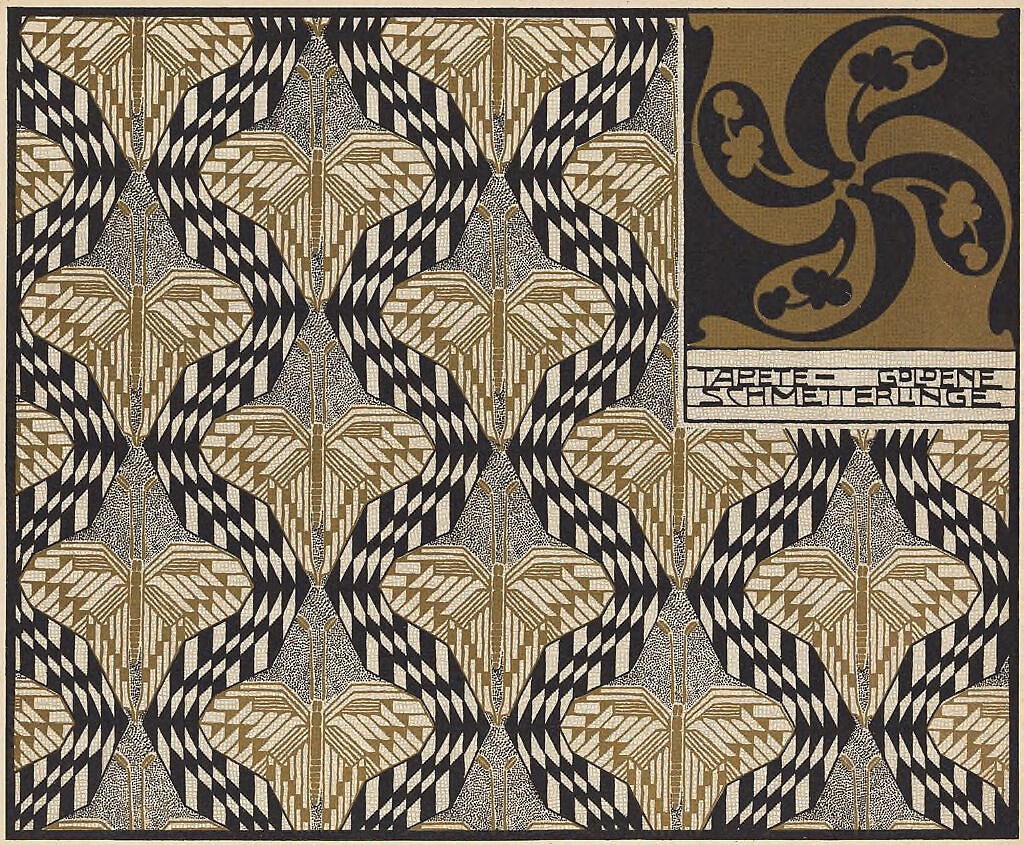Palning

Koloman Moser: "Golden Butterflies" wallpaper design
from the portfolio "Surface Decoration" (1902)
"… better to disappoint ourselves by sequencing our desires …"
Planning for a few days’ respite in New York City, I again encounter my embarrassing relationship with planning. Though I spent the bulk of my working life actively engaged in planning, I have always been lousy at it. I might have been attracted to the activity merely because I performed it so poorly. I might have mistakenly believed practice would eventually resolve this increasingly glaring shortcoming, but it hasn't. I worked my way up the career ladder instead, moving on from participating in creating plans into teaching others how to do what I had clearly never mastered. I might have even risen to the peak of my ineptness there, embodying every element of the infamous Peter Principle, rising to inhabit the pinnacle of my incompetence. My heritage and legacy stand there, a testament to man's inherent inhumanity, how one might embrace their inability rather than master something for themselves.
This might be the most human trick, the call of desire muffling reasoning. We see followers aspiring to become leaders, depriving the world of another first-class follower while preventing an actual leader from ascending. It might be that every professional, or most of them, enlist in their profession in the naive belief that practicing might enable them to overcome their inherent dyslexia when engaging in it. It might be that best practices were all proposed by those with imposter issues. Professionals might be rank amateurs too embarrassed to admit their shortcomings. We might all properly suffer from our own brand of imposter syndrome, not nearly as skilled as we wish, and painfully aware that we're not getting any better at performing or at hiding our increasingly glaring fallibilities.
Retirement brings little respite, for who could be counted as proficient in skillfully aging out of the employment pool? The question troubles those who rose to somewhere near the top of their profession, enabling them to become imposters emeritus or some rough equivalent. Some enter public service, volunteering their expertise to help upcoming imposters better cope with their challenges. Heaven have mercy on those widely perceived as masters, for their clay feet will reliably give them away wherever they practice. Painful questions will arise, ones lacking anything resembling crisp responses. Dissembling masters disappoint adoring novices until they graduate to become dissembling masters who notice how they disappoint their adoring neophytes, too. What's an honest practitioner to do?
We might grow into the ability to admit this truth to ourselves. We need not share our secret. We might be wisest to keep our own council. The structure and appearance of the profession need not adapt to this recognition, for it might be meant exclusively for personal consumption. The quiet admission, though, might make a real difference in helping us imposters to not so much continue deceiving but to continue believing that even our ineptness makes some difference in this world, that no past master ever managed to transcend their inherent limitations, either. Transcendence might only be achieved through humble recognition. I have become much more adept at improvisation. I suspect I encouraged this gift as a direct result of my inherent ineptness when planning.
The Muse and I have been mumbling through the possibilities for a few days we plan to spend in New York City. The possibilities might just as well be infinite. We discuss innumerable alternatives to see what might stick. We will probably not make many reservations, even though this choice might eliminate some preferences. The problem with planning always seems to reduce to an embarrassment of riches. If we aren't blessed with an infinite budget allocation, we get blessed with limitless desires. We suffer more from indigestion than starvation, but we more clearly perceive what we're missing. Planning might serve as a placeholder to distract us from overly influencing a universe that was always dead set on manifesting, regardless of our preferences. Perhaps it is better to disappoint ourselves by sequencing our desires than to inhibit the orderly unfolding of our future as it intended.
©2023 by David A. Schmaltz - all rights reserved


